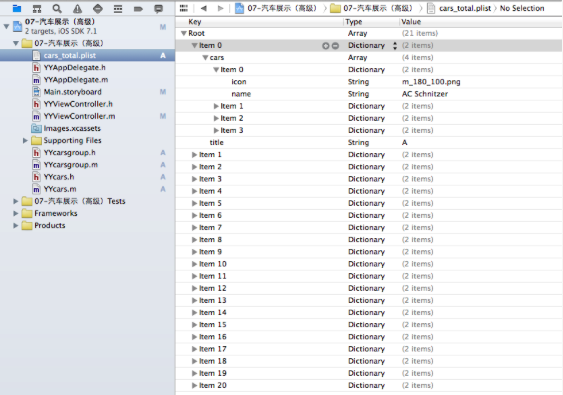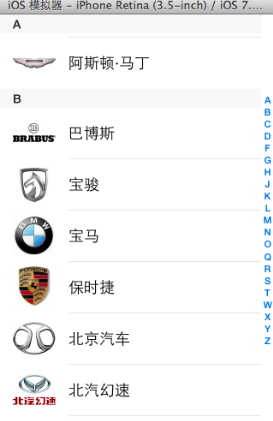iOS开发UI篇—使用嵌套模型完成的一个简单汽车图标展示程序
一、plist文件和项目结构图

说明:这是一个嵌套模型的示例
二、代码示例:
YYcarsgroup.h文件代码:
// // YYcarsgroup.h // 07-汽车展示(高级) // // Created by apple on 14-5-28. // Copyright (c) 2014年 itcase. All rights reserved. // #import <Foundation/Foundation.h> @interface YYcarsgroup : NSObject @property(nonatomic,copy)NSString *title; @property(nonatomic,strong)NSArray *cars; -(instancetype)initWithDict:(NSDictionary *)dict; +(instancetype)carsgroupWithDict:(NSDictionary *)dict; @end
YYcarsgroup.m文件代码:
// // YYcarsgroup.m // 07-汽车展示(高级) // // Created by apple on 14-5-28. // Copyright (c) 2014年 itcase. All rights reserved. // #import "YYcarsgroup.h" #import "YYcars.h" @implementation YYcarsgroup -(instancetype)initWithDict:(NSDictionary *)dict { if (self=[super init]) { //嵌套的字典转模型 self.title=dict[@"title"]; //注意 NSArray *dictcars=dict[@"cars"]; //像下面这样写可以提高性能 NSMutableArray *arrayM=[NSMutableArray arrayWithCapacity:dictcars.count]; for (NSDictionary *dict in dictcars) { YYcars *yycars=[[YYcars alloc]initWithDict:dict]; [arrayM addObject:yycars]; } // 赋值存储模型的数组给属性 self.cars=arrayM; } return self; } +(instancetype)carsgroupWithDict:(NSDictionary *)dict { return [[self alloc]initWithDict:dict]; } @end
YYcars.h文件
// // YYcars.h // 07-汽车展示(高级) // // Created by apple on 14-5-28. // Copyright (c) 2014年 itcase. All rights reserved. // #import <Foundation/Foundation.h> @interface YYcars : NSObject @property(nonatomic,copy)NSString *name; @property(nonatomic,copy)NSString *icon; -(instancetype)initWithDict:(NSDictionary *)dict; +(instancetype)carsWithDict:(NSDictionary *)dict; @end
YYcars.m文件
// // YYcars.m // 07-汽车展示(高级) // // Created by apple on 14-5-28. // Copyright (c) 2014年 itcase. All rights reserved. // #import "YYcars.h" @implementation YYcars -(instancetype)initWithDict:(NSDictionary *)dict { if (self=[super init]) { self.name=dict[@"name"]; self.icon=dict[@"icon"]; } return self; } +(instancetype)carsWithDict:(NSDictionary *)dict { return [[self alloc]initWithDict:dict]; } @end
YYViewController.m文件
// // YYViewController.m // 07-汽车展示(高级) // // Created by apple on 14-5-28. // Copyright (c) 2014年 itcase. All rights reserved. // #import "YYViewController.h" #import "YYcarsgroup.h" #import "YYcars.h" @interface YYViewController ()<UITableViewDataSource> @property (strong, nonatomic) IBOutlet UITableView *tableview; @property(nonatomic,strong) NSArray *car; @end @implementation YYViewController - (void)viewDidLoad { [super viewDidLoad]; self.tableview.rowHeight=60.f; self.tableview.dataSource=self; NSLog(@"%d",self.car.count); } #pragma mark- 实现懒加载 //1.从包中读取数据 //2.字典转模型 //3.返回cars -(NSArray *)car { if (_car==nil) { NSString *fullpath= [[NSBundle mainBundle]pathForResource:@"cars_total.plist" ofType:nil]; NSArray *arrayM=[NSArray arrayWithContentsOfFile:fullpath]; NSMutableArray *carsarray=[NSMutableArray array]; for (NSDictionary *dict in arrayM) { YYcarsgroup *carsgroup=[YYcarsgroup carsgroupWithDict:dict]; [carsarray addObject:carsgroup]; } _car=[carsarray copy]; } return _car; } #pragma mark- 实现tableview的数据展示 //1.设置数据源,遵守协议 //2.返回组 //3.返回行 //4.每组每行对应的数据 //4.1去缓存中去取cell //4.2若没有,则创建cell,并盖章 //4.3设置cell的数据 //4.4返回cell -(NSInteger)numberOfSectionsInTableView:(UITableView *)tableView { return self.car.count; } -(NSInteger)tableView:(UITableView *)tableView numberOfRowsInSection:(NSInteger)section { YYcarsgroup *carsgroup=self.car[section]; return carsgroup.cars.count; } -(UITableViewCell *)tableView:(UITableView *)tableView cellForRowAtIndexPath:(NSIndexPath *)indexPath { static NSString *identifier=@"car"; //4.1去缓存中去取cell UITableViewCell *cell=[tableView dequeueReusableCellWithIdentifier:identifier]; //4.2若没有,则创建cell,并盖章 if (cell==nil) { cell=[[UITableViewCell alloc]initWithStyle:UITableViewCellStyleDefault reuseIdentifier:identifier]; } //4.3设置cell的数据 //设置对应的组 YYcarsgroup *carsgroup=self.car[indexPath.section]; //设置对应的行 YYcars *yycars=carsgroup.cars[indexPath.row]; cell.imageView.image=[UIImage imageNamed:yycars.icon]; cell.textLabel.text=yycars.name; //4.4返回cell return cell; } //设置每组的标题 -(NSString *)tableView:(UITableView *)tableView titleForHeaderInSection:(NSInteger)section { YYcarsgroup *carsgroup=self.car[section]; return carsgroup.title; } //设置索引 -(NSArray *)sectionIndexTitlesForTableView:(UITableView *)tableView { //利用kvc取出所有的标题 NSArray *title=[self.car valueForKeyPath:@"title"]; return title; } //隐藏状态栏 -(BOOL)prefersStatusBarHidden { return YES; } @end
实现效果:

三、注意点
1.设置索引
代码如下:
//设置索引 -(NSArray *)sectionIndexTitlesForTableView:(UITableView *)tableView { //利用kvc取出所有的标题 NSArray *title=[self.car valueForKeyPath:@"title"]; return title; }
2.cell的性能优化
代码如下:
static NSString *identifier=@"car"; //4.1去缓存中去取cell UITableViewCell *cell=[tableView dequeueReusableCellWithIdentifier:identifier]; //4.2若没有,则创建cell,并盖章 if (cell==nil) { cell=[[UITableViewCell alloc]initWithStyle:UITableViewCellStyleDefault reuseIdentifier:identifier]; }
请注意:cell内部数据处理的细节。(如何节省内存?)